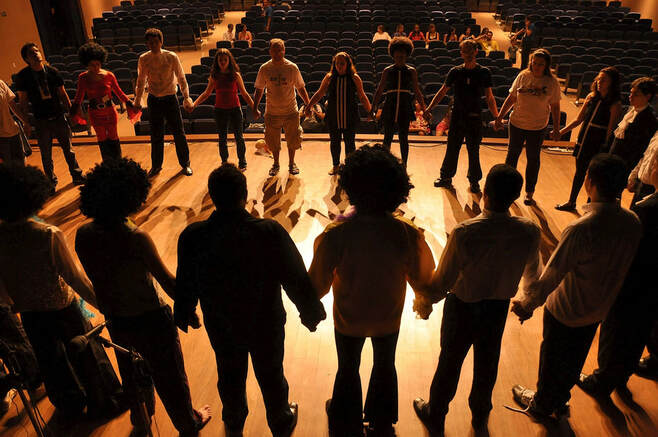|
At Music Training Center (MTC) in Philadelphia, children can take lessons in music and voice training. They can also participate in an a cappella vocal ensemble, Rock Band classes, or a number of high-quality musical theater productions. Over the years, Music Training Center has nurtured the talents of a number of promising young musicians and performers. The musical theater component is one of the organization’s signature programs. Kids in the upper elementary, middle school, and early high school grades can participate in its Main Stage musical production. Younger kids work on their own Junior Stage and Mini Stage productions. Popular musicals serve as an excellent way to engage kids with learning the basics of musical theater stagecraft. Experts in the performing arts have noted musical theater’s ability to develop a wide range of essential talents and skills in children who are considering making any branch of acting or performing a lifelong career. Further, musical theater training can lay the foundation for the kind of self-confidence, physical and mental stamina and agility, and personal presentation skills that will enhance a young person’s performance in any other type of career later on. There are many reasons to encourage your child to participate in musical theater. Here are four: 1. Musical theater programs are available throughout the countryThe MTC program is only one of many across the country that focus, either year-round or as a special summer experience, on the wealth of benefits that participation in a musical theater production can provide for children. The Performers Theatre Workshop in New Jersey, the Music Institute of Chicago, and San Francisco Children’s Musical Theater are only a few more examples of organizations that offer this kind of vibrant and engaging—and potentially life-changing—programming. 2. Musical theater helps teach movement, communication, and confidence.For example, kids who participate in musical theater training learn a whole set of movement skills. These skills can improve coordination, kinetic awareness, and overall fitness. In addition, training the voice to perform songs in a musical theater production tends to strengthen the vocal chords. They also benefit the performer’s overall voice presentation. This is a helpful tool for leaders and communicators in any field. Experts in teaching musical theater additionally point out that confidence is among the main takeaways from participation for many kids. Musical theater can take performers far beyond their familiar comfort zones. A student who primarily views herself as an actor might be asked to sing in a particular production. Another who thinks of himself only as a dancer might be called on to learn and speak lines of dialogue to convey an emotional experience. These activities might at first give young performers a case of nerves. Ultimately, however, this type of multifaceted training can open doors onto new ideas, build new skills, and create a sense of accomplishment in ways that stay meaningful over a lifetime. 3. Musical theater boosts self-esteem. One dissertation-related study, published in 2017 under the auspices of Concordia University-Portland, found that music and theater studies, individually, offer enormous potential. They can help middle school students develop their self-esteem and their scholastic achievement. The study goes even further by exploring the ways in which the combination of the two subjects in musical theater can lift up middle school students’ sense of self-worth and facilitate their achievement in a number of ways. In this particular study, about a dozen suburban private school students in Minnesota took part in staging a musical theater event. The researcher used direct observation, interviews, school records, and Likert scale surveys to gauge the degree to which the students engaged in a positive or negative way with the experience. The study concluded that if a student came into the production with already-high levels of self-esteem, he or she did not experience an additional boost of self-esteem from participation. On the other hand, if a student had a lower level of self-esteem before the production, he or she was more likely to develop more openness to being flexible and taking on novel tasks during the course of the production. These students also showed increased comfort with the process of change during the production. 4. Musical theater is fun!One remaining important aspect of performing in musical theater: it's fun. Kids of all ages enjoy meeting familiar or intriguing characters from movies, books, or TV shows translated onto the stage.
When they take on the personas of these characters themselves, they can find creative new ways to express themselves. They can also deepen their awareness of their own emotions and let their imaginations take them on new adventures. Comments are closed.
|
Photo used under Creative Commons from Marina K Caprara

 RSS Feed
RSS Feed
